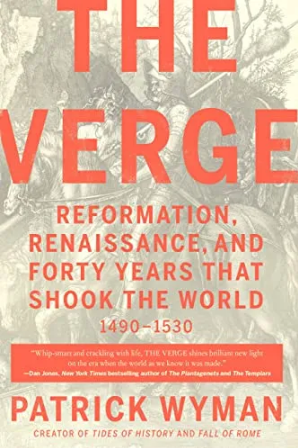The latest book review from Mr. and Mrs. Psmith’s Bookshelf features Patrick Wyman’s The Verge: Reformation, Renaissance, and Forty Years that Shook the World:
This is a weird Substack featuring an eclectic selection of books, but one of our recurring interests is the Great Divergence: why and how did the otherwise perfectly normal people living in the northwestern corner of Eurasia managed to become overwhelmingly wealthier and more powerful than any other group in human history? We’ve covered a few theories about what’s behind it — not marrying your cousins, coal, the analytic mindset (twice) — but there are lots of others we’ve never touched, including geographic and thus political fragmentation, proximity to the New World, and even the Black Death. So this is also a book about the Great Divergence, but unlike many of the others it doesn’t offer One Weird Trick to explain things. Instead, Wyman approaches the period between 1490 and 1530 through nine people, each of whom exemplifies one of the many shifts in European society, and so paints a portrait of a changing world.
Of course, he does point to a common thread woven through many of the changes: culture. Or, more specifically, the institutions1 surrounding money and credit that Europeans had spent the last few hundred years developing. But these weren’t themselves dispositive: after all, lots of people in lots of place at lots of times have been able to mobilize capital, and most of them don’t produce graphs that look like this. Really, the secret ingredient was — as Harold Macmillan said of the greatest challenge to his government — “events, dear boy, events”.2 Europe between 1490 to 1530 saw an unusually large number of innovations and opportunities for large-scale, capital-intensive undertakings, and already had the economic institutions in place to take advantage of them. One disruption fed on the next in a mutually-reinforcing process of social, political, religious, economic, and technological change that (Wyman argues) set Europe on the path towards global dominance.
Some of Wyman’s characters — Columbus, Martin Luther, Holy Roman Emperor Charles V — are intensely familiar, but he presents them with verve, as interested in giving you a feel for the individual and their world as in conveying biographical detail. (This is an underrated goal in the writing of history, but really invaluable; the “Cross Section: View from …” chapters were always my favorite part of Jacques Barzun’s idiosyncratic doorstopper From Dawn to Decadence.) This is particularly welcome when it comes to the chapters featuring some lesser-known figures: you may have heard of Jakob Fugger, but unless you’re a Wimsey-level fan of incunabula you’re probably unfamiliar with Aldus Manutius. One-handed man-at-arms Götz von Berlichingen becomes our lens for the chapter about the Military Revolution not because he played a particularly significant role but because he wrote a memoir, and small-time English wool merchant John Heritage is notable pretty much solely because his account book happened to survive into the present. But even with the stories “everyone knows”, Wyman takes several large steps back in order to contextualize that common knowledge: for example, were you aware that while before 1492 Columbus didn’t take any particularly unusual voyages, he did take an unparalleled number and variety of them, making him one of the best-travelled Atlantic sailors of his day? Did you know that Isabella’s inheritance of the Castilian throne was far from certain?3
As the book continues, Wyman can reference the cultural and technological shifts he described in earlier chapters. For instance, much of the Fuggers’ wealth came in the form of silver from deep new mines in the Tyrol. Building the mines required substantial capital — for their new, deeper tunnels and the expensive pumps to drain them, as well as for the furnaces and workshops to separate the copper from the silver via the relatively inefficient liquation process — and while everyone knew all along that the metals were there, it took the combination of a continent-wide bullion shortage and a rising demand for copper to cast bronze cannon (look back to the chapters on state formation and the military!) to make it worth anyone’s while to get them out. But it wasn’t only the Fuggers who made their money in these new mines: the money for Martin Luther’s education came from his father’s small-scale copper mining concern in eastern Germany. Grammar school in his hometown, a parish school nearby, and then four years at university cost Luther pater enough that he couldn’t follow it up for his younger sons (and from his point of view the was probably squandered when Martin became a monk instead of the intended lawyer who would be an asset in the frequent mining disputes), but such an education for even one son would have been out of reach if not for the printed texts on grammar, philosophy and law that made it all far more affordable.
Of course, the relationship between Luther and printing goes both ways. While Luther’s very existence as an educated man was enabled by the printing press, it was the intellectual and religious ferment he would kick off that made printing work.
1. Wyman glosses the term as “a shared understanding of the rules of a particular game … the systems, beliefs, norms and organizations that drive people to behave in particular way”, but it’s more or less what I’ve elsewhere called bundles of social technologies.
2. Apparently he may not have said this, but he should have so print the legend.
3. Isabella’s opponent, her half-niece Joanna, was married to King Afonso V of Portugal, so perhaps some degree of Iberian unification might still have followed. On the other hand, Afonso already had an adult son (King João II, widely admired as “the Perfect Prince” — Isabella always referred to him simply as el Hombre, “the Man”) who would have had no personal claim to Castile. Joanna and Afonso’s marriage was annulled on the perfectly true grounds of consanguinity — he was her uncle — after they lost the war, so they never had children, but if she had won perhaps João (who died without legitimate issue) could have been succeeded by a much younger half-Castilian half-brother. Certainly an Isabella relegated to Queen-Consort of Aragon would still have been a force to be reckoned with, but losing the knock-on effects of her reign (Columbus, Granada, the fate of the Sephardim, not to mention the eventual unification of most of Europe under Ferdinand and Isabella’s Habsburg grandson) makes all this a pretty good setup for an alternate history!
Even more fun: before she married Ferdinand of Aragon, there was discussion of Isabella’s betrothal to Richard, Duke of Gloucester. Yeah, that one.






